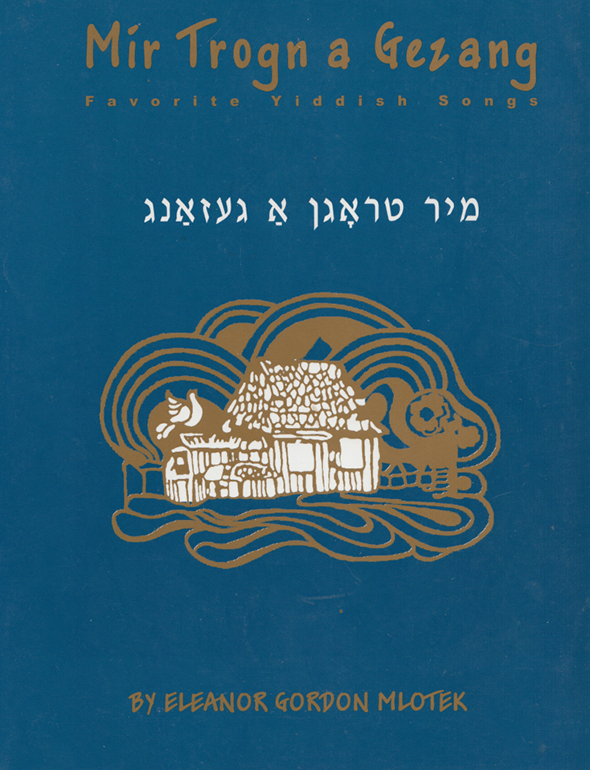Folk song published by M. Beregovski and I. Ferrer in 1938. The song was heard in the Czech movie, The Shop on Main Street.

A girl sits on the hearth,
tumba, tumba, tumba-ba,
embroidering a white dress,
tumba, tumba, tumba-ba.
In swoops a lad
tumba, tumba tumba-ba
and pulls out a thread
tumba, tumba, etc.
“Oh, you impudent young man,
you will pay dearly for that.
I won’t ask you where you’re from,
but I won’t let you leave,
I will embrace you and love you.”
And so the lad stayed there.
Now there are two, sitting on the hearth,
neither sewing nor embroidering. . .
Oyfn oyvn zitst a meydl,
Tumba, tumba, tumba-ba;
Un zi heft a vayse kleydl,
Tumba, tumba, tumba-ba.
lz a bokher ongefloygn,
Un hot dem fodem opgetsoygn.
— Ay, du bokher, ay, du fayer,
S’vet dikh kostn zeyer tayer.
Kh’vel nit fregn dikh fun vanen,
Kh’vel nit oplozn fun danen.
Kh’vel dikh haldzn, kh’vel dikh libn,
lz der bokher dort farblibn.
Oyfn oyvn zitsn tsveyen,
Nit zey heftn, nit zey neyen. . .
אױפֿן אױװן זיצט א מײדל,
טומבאַ, טומבאַ, טומבאַ–באַ,
און זי העפֿט אַ װײַסע קלײדל,
טומבאַ–טומבאַ, טומבאַ-באַ.
איז אַ בחור אָנגעפֿלױגן
און האָט דעם פֿאָדעם אָפּגעצױגן.
— אײַ דו בחור, אײַ דו פֿײַער,
ס’װעט דיך קאָסטן זײער טײַער.
כ’װעל ניט פֿרעגן דיך פֿון װאנען,
כ’װעל ניט אָפּלאָזן פֿון דאַנען.
כ’װעל דיך האַלדזן, כ’װעל דיך ליבן,
איז דער בחור דאָרט פֿאַרבליבן.
אױפֿן אױװן זיצן צװײען,
ניט זײ העפֿטן, ניט זײ נײען. . .
Song Title: Tumba

First published in 1972, Mir Trogn A Gezang: Favorite Yiddish Songs was reprinted six more times (in 1977, 1982, 1985, 1987, 1988, 2000) due to popular demand. The songs in this anthology represent a sampling of beloved folk and well-known Yiddish songs, many of which are scattered in various song collections; some appear in very rare and inaccessible collections; and some were never before published. Folk songs comprise about a third of this volume and were selected mainly on the basis of popularity and sometimes for their historic significance. Needless to say, they are only representative of the vast, rich treasure of Yiddish folk material. The selection was made not only on the basis of personal preference, but in the knowledge they are favorites of many who sing these songs. Most of the songs represent the repertoire that was sung at Yiddish summer camps, May 1st demonstrations and at social gatherings. Many songs were introduced to American Jewry by Jewish immigrants who came to the United States after World War II, for whom these songs had been favorites in Poland and other East European communities destroyed by the Nazis.